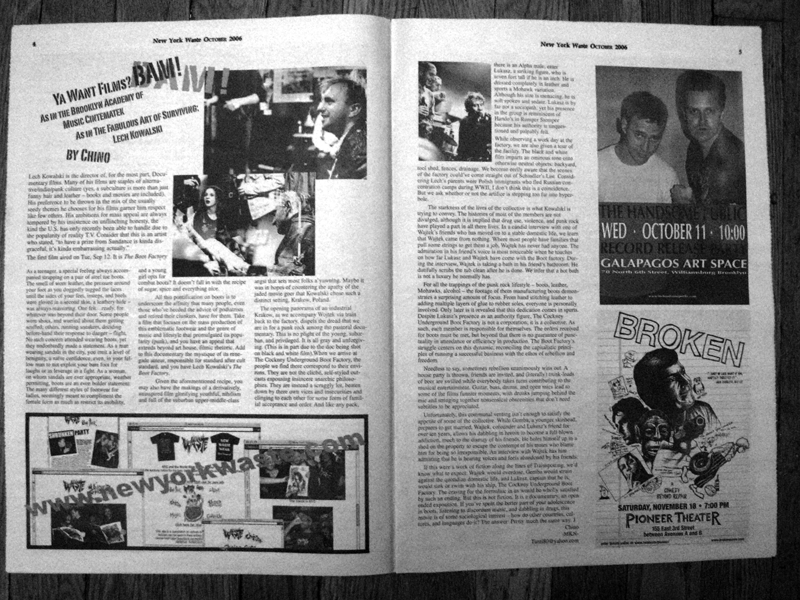NY Waste - Halloween 2006
|
BOOT FACTORY Ya Want Films? BAM! Lech Kowalski is the director of, for the most part, documentary films. Many of his films are staples of alternative/indie/punk culture (yes, a subculture is more than just funny hair and leather – books and movies are included). His preference to be thrown in the mix of the usually seedy themes he chooses for his films garner him respect like few others. His ambitions for mass appeal are always tempered by his insistence on unflinching honesty, the kind the U.S. has only recently been able to handle due to the popularity of reality T.V. Consider that this is a director who stated, “to have a prize from Sundance is kinda disgraceful, it’s kinda embarrassing actually.” The first film aired on Tue, Sep 12. It is The Boot Factory As a teenager, a special feeling always accompanied strapping on a pair of steel toe boots. The smell of worn leather, the pressure around your foot as you doggedly tugged the laces until the sides of your feet, insteps, and heels were gloved in a second skin, a leathery hide – was always reassuring. One felt…ready, for whatever was beyond their door. Some people wore shoes, and worried about them getting scuffed; others, running sneakers, deciding before-hand their response to danger – flight. No such concern attended wearing boots, yet they undoubtedly made a statement. As a man wearing sandals in the city, you emit a level of benignity, a naïve confidence, even, in your fellow man to not exploit your bare foot for laughs or as leverage in a fight. As a woman, on whom sandals are ever appropriate, weather permitting, boots are an even bolder statement: The many different styles of footwear for ladies, seemingly meant to compliment the female form as much as restrict its mobility, and a young girl opts for combat boots? It doesn’t fall in with the recipe of sugar, spice and everything nice. All this pontification on boots is to underscore the affinity that many people, even those who’ve heeded the advice of podiatrists and retired their clunkers, have for them. Take a film that focuses on the mass production of this emblematic footwear and the genre of music and lifestyle that promulgated its popularity (punk), and you have an appeal that extends beyond art house, filmic rhetoric. Add to this documentary the mystique of its renegade auteur, responsible for standard after cult standard, and you have Lech Kowalski’s The Boot Factory. Given the aforementioned recipe, you may also have the makings of a derivatively uninspired film glorifying youthful nihilism and full of the kind of suburban upper-middle-class angst that rings hollow. Maybe it was in hopes of countering the apathy of the jaded movie goer that Kowalski chose such a distinct setting, Krakow, Poland. The opening panorama of an industrial Krakow, as we accompany Wojtek via train back to the factory, dispels the dread that we are in for a punk rock among the pastoral documentary. This is no plight of the young, suburban, and privileged. It is all gray and unforgiving. (This is in part due to the doc being shot in black and white).When we arrive at The Cockney Underground Boot Factory, the people we find there correspond to their environ. They are not the cliché, self-styled outcasts espousing insincere anarchic philosophies. They are instead a scraggly lot, beaten down by there own vices and insecurities and clinging to each other for some form of familial acceptance and order. And like any pack, there is an Alpha male; enter Lukasz, a striking figure, who is seven feet tall if he is an inch. He is dressed completely in leather and sports a Mohawk variation. Although his size is menacing, he is soft spoken and sedate. Lukasz is by far not a sociopath, yet his presence in the group is reminiscent of Hando’s in Romper Stomper because his authority is unquestioned and palpably felt. While observing a work day at the factory, we are also given a tour of the facility. The black and white film imparts an ominous tone onto otherwise neutral objects: backyard, tool shed, fences, drainage. We become eerily aware that the scenes of the factory could’ve come straight out of Schindler’s List. Considering Lech’s parents were Polish immigrants who fled Russian concentration camps during WWII, this is no coincidence. But we ask whether or not the artifice is stepping too far into hyperbole. The starkness of the lives of the collective is what Kowalski is trying to convey. The histories of most of the members are not divulged, although it is implied that drug use, violence, and punk rock have played a part in all their lives. In a candid interview with one of Wajtek’s friends who has moved on to a stable domestic life, we learn that Wajtek came from nothing. Where most people have families that pull some strings to get them a job, Wajtek has never had anyone. The admiration in his friend’s voice is most noticeable when he touches on how far Lukasz and Wajtek have come with the Boot factory. During the interview, Wajtek is taking a bath in his friend’s bathroom. He dutifully scrubs the tub clean after he is done. We infer that a hot bath is not a luxury he normally has. For all the trappings of the punk rock lifestyle – boots, leather, Mohawks, alcohol – the footage of them manufacturing boots demonstrates a surprising amount of focus. From hand stitching leather to adding multiple layers of glue to rubber soles, everyone is personally involved. Only later is it revealed that this dedication comes in spurts. Despite Lukasz’s presence as an authority figure, The Cockney Underground Boot Factory is not a corporation; it is a collective. As such, each member is responsible for themselves. The orders received for boots must be met, but beyond that there is no guarantee of punctuality in attendance or efficiency in production. The Boot Factory’s struggle centers on this dynamic, reconciling the capitalistic principles of running a successful business with the ethos of rebellion and freedom. Needless to say, sometimes rebellion unanimously wins out. A house party is thrown, friends are invited, and (literally) trunk-loads of beer are swilled while everybody takes turns contributing to the musical entertainment. Guitar, bass, drums, and open mics lead to some of the films funnier moments, with drunks jumping behind the mic and stringing together nonsensical obscenities that don’t need subtitles to be appreciated. Unfortunately, this communal venting isn’t enough to satisfy the appetite of some of the collective. While Gemba, a younger skinhead, prepares to get married, Wajtek, cofounder and Lukesz’s friend for over ten years, allows his dabbling in heroin to become a full blown addiction, much to the dismay of his friends. He holes himself up in a shed on the property to escape the contempt of his mates who blame him for being so irresponsible. An interview with Wajtek has him admitting that he is hearing voices and feels abandoned by his friends. If this were a work of fiction along the lines of Trainspotting, we’d know what to expect: Wajtek would overdose, Gemba would strain against the quotidian domestic life, and Lukesz, captain that he is, would sink or swim with his ship, The Cockney Underground Boot Factory. The craving for the formulaic in us would be wholly satisfied by such an ending. But this is not fiction. It is a documentary, an open ended exposition. If you’ve spent the better part of your adolescence in boots, listening to discordant music, and dabbling in drugs, this movie is of some sociological interest – how do other countries, cultures, and languages do it? The answer: Pretty much the same way. Chino -MKN-
|


